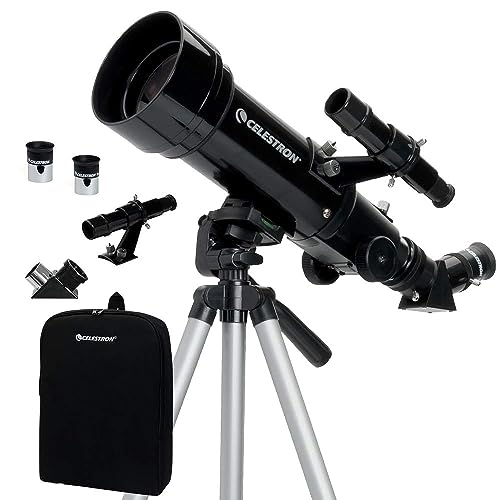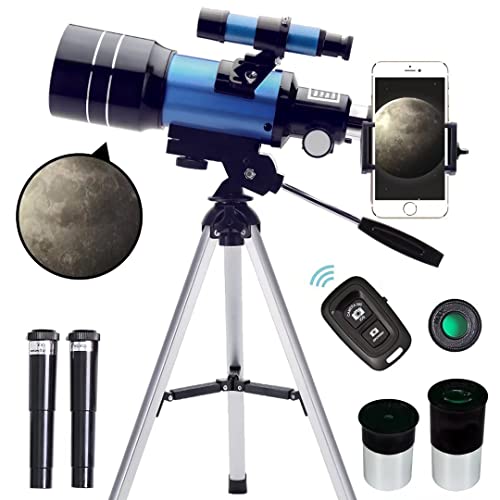Celestron: Celestron - PowerSeeker 80EQ Telescope
- 360 mm focal length and 80 mm aperture.
- Refractor telescope.
- German equatorial mount.
- Optical finder scope.
- 45x, 225x magnification.
Gskyer Telescope, Telescopes for Adults, 80mm AZ Space Astronomical Refractor Telescope Kids
- 400 mm focal length & 80 mm aperture.
- Refractor telescope.
- AZ altazimuth tripod mount.
- 6 * 30 finderscope.
- Up to 18x magnification.
Celestron - PowerSeeker 127EQ Telescope
- 127mm aperture size.
- Newtonian reflector telescope.
- German equatorial mount.
- Optical finderscope.
- 250x magnification.
Celestron - 70mm Travel Scope DX - Portable Refractor Telescope - Fully-Coated Glass Optics - Ideal Telescope for Beginners
- 70mm aperture.
- Refractor telescope.
- Pan handle alt-az mount.
- Optical finder scope.
- 80x magnification.
Celestron - 70mm Travel Scope - Portable Refractor Telescope - Fully-Coated Glass Optics
- 70mm aperture size.
- Refractor telescope.
- Alt-az mount.
- Optical finder.
- Up to 40x magnification.
Gskyer Telescope • 70mm Aperture • 400mm AZ Mount • Astronomical Refracting Telescope • for Kids Beginners
- Brand: Gskyer.
- Eye Piece Lens Description: Barlow.
- Objective Lens Diameter: 70 Millimeters.
- Telescope Mount Description: Altazimuth Mount.
- Focus Type: Manual Focus.
- Power Source: Adapter.
Telescope for Kids Beginners Adults, 70mm Astronomy Refractor Telescope with Adjustable Tripod
- 70mm aperture.
- Refractor telescope.
- Alt-az mount.
- Optical finder scope.
- 128x magnification.
Celestron - AstroMaster 70AZ Telescope - Refractor Telescope - Fully Coated Glass Optics - Adjustable Height Tripod
- Quick and easy no-tool setup.
- Permanently mounted StarPointer.
- Erect image optics - Ideal for terrestrial and astronomical use.
- Quick release dovetail attachment - no tool setup.
- Pan handle Alt-Az control with clutch - for smooth and accurate pointing. Optical Lens Diameter 2.6.
AOMEKIE 40070 Telescopes for Astronomy Beginners Kids and Adults 70mm Astronomical Telescopes
- 60 mm lens & 700 mm focal length.
- Refractor telescope.
- Adjustable aluminum tripod.
- 5×20 finderscope.
- 28x – 234x magnification.
ToyerBee Telescope for Adults & Kids, 70mm Aperture (15X-150X) Portable Refractor Telescopes for Astronomy Beginners
- Brand ToyerBee.
- Eye Piece Lens Description Barlow.
- Objective Lens Diameter: 70 Millimeters.
- Manual Focus.
- Power Source Adapter.
- Finderscope Reflex.
The Evolution of Telescope Technology
Over the centuries, telescope technology has evolved significantly, driven by the pursuit of clearer, more distant, and more detailed observations of the universe.
- Refractors and Reflectors: The earliest telescopes were refractors, using lenses to gather and focus light. Isaac Newton introduced the reflecting telescope in the late 17th century, which used mirrors instead of lenses to collect light, solving issues of chromatic aberration and allowing for larger telescopes.
- The Rise of Giant Observatories: The 19th and 20th centuries saw the construction of massive ground-based observatories equipped with ever-larger mirrors, enabling astronomers to observe distant galaxies, nebulae, and stars with unprecedented clarity.
- The Space Telescope Era: The launch of the Hubble Space Telescope in 1990 marked a new era in astronomical observations, free from the distortions of Earth’s atmosphere. Hubble and its successors, including the James Webb Space Telescope, have provided unparalleled views of the universe, from the planets in our solar system to the earliest galaxies.
Impact on Science and Society
- Expanding Our Understanding of the Universe: Telescopes have been instrumental in major astronomical discoveries, including the expansion of the universe, the existence of exoplanets, and the detection of gravitational waves. These discoveries have fundamentally altered our understanding of the cosmos and our place within it.
- Inspiring Curiosity and Imagination: Beyond their scientific contributions, telescopes have captivated the public imagination, inspiring countless individuals to ponder the mysteries of the universe. They serve as a bridge between the scientific community and the public, highlighting the beauty and wonder of the cosmos.
- Challenges and Future Prospects: Despite their advancements, ground-based telescopes face limitations from atmospheric distortion and light pollution. The future of telescopic exploration lies in space-based observatories and the development of advanced technologies like adaptive optics, which compensates for atmospheric turbulence, and the construction of even larger ground-based telescopes designed to probe the depths of the cosmos with unprecedented detail.
Conclusion
Telescopes are more than just instruments of scientific inquiry; they are symbols of human curiosity and our unending quest to understand the universe. From Galileo’s first gaze into the night sky to the complex space observatories of today, telescopes have continuously opened new windows into the cosmos, revealing the intricate beauty and profound mysteries of the universe. As technology advances, so too will our ability to explore the farthest reaches of space, reminding us that the final frontier is not as unreachable as it once seemed.
Trusting our Top Picks
Exploring the numerous decisions for each shopper buy can challenge. Our group goes through hours doing research, sifting through discussions, and perusing shopper surveys on even the most fundamental of family things, and we sum up that data in clear, precise comparisons. Join the millions that have confided in guidebyexpert.com to assist them with pursuing more brilliant purchasing choices. We assist our perusers with spending their money wisely and find the right product to suit their specific needs.
Advertising Disclosure: Guidebyexpert.com is backed by its users. We may receive an affiliate commission when you purchase something from our site's promoted products.










